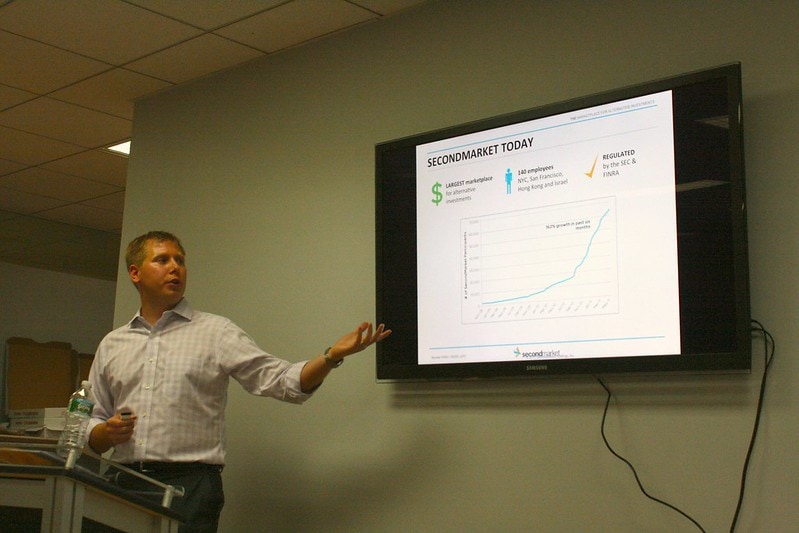- 8 Largest Bitcoin Wallets in the World
- Tim Draper
- Did you know?
- Barry Silbert
- Did you know?
- Tyler and Cameron Winklevoss
- Did you know?
- FBI
- Did you know?
- BitFinex
- Did you know?
- Bulgaria
- Did you know?
- Micree Zhan
- Did you know?
- Satoshi Nakamoto
- Did you know?
- Best Bitcoin Wallets
- Coinbase wins as a simple way to buy, sell, and hold cryptocurrencies
- Best Bitcoin Wallets of 2021
- Best Overall : Coinbase
- Best for Hardware Wallet for Security : Trezor
- Best Hardware Wallet for Durability : Ledger
- Best for Beginners : SoFi
- Best for Free Buying and Selling : Robinhood
- Best for Mobile : Mycelium
- Best for Desktop : Exodus
- Final Verdict
- Compare the Best Bitcoin Wallets
- Frequently Asked Questions
- How Do I Use a Bitcoin Wallet?
- How Much Money Do I Need To Invest in Bitcoin?
- Pros and Cons of Digital Bitcoin Storage
- How Should I Choose a Bitcoin Wallet?
- Methodology
8 Largest Bitcoin Wallets in the World
Cryptocurrencies have become popular due to their anonymity and versatility, and countless people around the world dream of hitting it big with their coin of choice. However, through the rise and fall of so many different options, many still swear by the original: Bitcoin. These devoted investors squirrel away as much as they can in private Bitcoin wallets.
So, just how much are the largest Bitcoin wallets worth? Today we’ll be ranking 8 of the largest Bitcoin wallets in the world according to their approximate value in US Dollars, as well as learning some fun facts about the ones who own them.
Tim Draper

Venture capitalist Tim Draper is famous for having founded Draper University, Draper Fisher Jurvetson, the Draper Venture Network, and Draper Associates. He’s also an outspoken fan and advocate of Bitcoin, claiming that people will be laughed at for using fiat currencies, or national currencies, in under a decade. He also stated that his university would be the first to accept Bitcoin as a form of payment.
Draper was an auction winner of a sizeable chunk of the cryptocurrency seized by the FBI. He said that he was delighted to see Bitcoin receiving a larger spotlight, declaring his belief that Bitcoin was good for humanity and should be embraced by federal regulators.
Did you know?
Barry Silbert

Barry Silbert is the founder and CEO of DigitalCurrencyGroup, a venture capital company that primarily focuses on digital currency. He is also the founder of SecondMarket and the creator of the Bitcoin Investment Trust.
Silbert is a big advocate of Brainwallet, which enables people to maintain exclusive knowledge of the key that accesses their Bitcoin wallet. The idea is that you can learn your own special key phrase and store it in your memory, meaning that no one else can touch your cryptocurrency.
Did you know?
Silbert says that, while plenty of other cryptocurrencies are headed nowhere, Bitcoin will remain strong and steady in the future.
Tyler and Cameron Winklevoss

This twin pair of Olympic athletes became even more famous for a 2008 lawsuit in which they sued Mark Zuckerberg. They claimed that he’d stolen their “ConnectU” idea in order to create Facebook, and wound up settling for the pretty penny of $65 million. The whole event was attention-grabbing enough to be portrayed in the movie “The Social Network,” although the twins seemed miffed about how the movie portrayed them.
The Winklevoss brothers invested their settlement money in Bitcoin during its earlier days, with their sizeable contribution transforming the cryptocurrency’s value.
Did you know?
FBI

The FBI once boasted the second-largest Bitcoin wallet in the world after shutting down the online drug marketplace known as the Silk Road. The vast majority of the criminally-obtained Bitcoin belonged to Ross Ulbricht, the operator of the Silk Road who also went by the name “Dread Pirate Roberts”.
The original amount of Bitcoin confiscated from Ulbricht was reported to have been a stunning 600,000! However, the FBI was unable to access the full amount because much of it was secured with high-level encryption.
Many people were uncomfortable with the idea of a government-run agency holding such a high amount of Bitcoin, since an aversion to government currency control is what drives so many users to cryptocurrency in the first place.
Did you know?
Plenty of users figured out how to send messages to the FBI’s Bitcoin wallet and have sent it a series of sassy notes and memes.
BitFinex

BitFinex is one of the more well-known cryptocurrency exchanges, allowing users to trade and convert their cryptocurrencies online. They also happen to own one of the largest Bitcoin wallets in the world: a cold wallet where they store their wealth in order to protect it from hackers and cybersecurity breaches.
BitFinex has a bit of a checkered reputation, having experienced multiple security breaches and been subpoenaed by the U.S. Commodity Futures Trading Commission following accusations of mishandling their wealth. The company has denied all accusations of attempting to cover wealth and recently withdrew nearly $90 million from its cold wallet.
Did you know?
BitFinex’s most well-known breach occurred in 2016, and the company was only recently given 27.66270285 by the United States Government in order to recoup its losses.
Bulgaria

You might be surprised to learn that the country of Bulgaria has one of the largest stashes of Bitcoin in the world. The value of Bulgaria’s Bitcoin reserves actually surpasses that of their gold holdings, which is a historic milestone since it’s the first nation to ever reach that point.
Bulgaria’s methods of stockpiling their Bitcoin has been noticeably covert, with incomplete stories circulating in an attempt to explain how they got it. They were rumored to have seized their massive amount of Bitcoin from a group of cyber criminals. The bust purportedly involved raiding over 100 different addresses to apprehend the hackers.
Did you know?
If Bulgaria were to sell off its stash of Bitcoin, the resulting profits could wipe out a fifth or more of its national debt.
Micree Zhan

Electronics engineer Micree Zhan and his associate Jihan Wu are the founders of Bitmain, which makes computer chips specifically for Bitcoin mining. Bitmain sells ASIC-chip miners and boasts the status of being the largest digital currency mining company in China. Micree became extremely wealthy off the fruits of his own labor when the mining chips he engineered functioned well and became successful.
Micree Zhan and Jihan Wu are both rumored to be stepping down from their joint CEO positions, leaving many people wondering about the future of the company. Despite financial losses during the recent past, the reported value of the Bitmain company is an impressive $14 billion dollars.
Did you know?
Satoshi Nakamoto

Satoshi Nakamoto owns the largest Bitcoin wallet in the world by USD value. The inventor of Bitcoin, Satoshi is heavily shrouded in mystery. In fact, for years, no one even knew whether the name belonged to an individual or a group! Today, it is theorized that “Satoshi Nakamoto” was actually a pseudonym for the three original founders of Bitcoin: Dorian Nakamoto, Craig Wright, and Nick Szabo.
The number of Bitcoins that Satoshi owns is also heavily debated, but it’s rumored to be upwards of one million. The fact that Satoshi owns such a large percentage of the Bitcoin currency has led people to suspect that it’s a Ponzi Scheme.
Did you know?
Despite people theorizing that Dorian Nakamoto was one of the founders of Bitcoin and faces of the Satoshi name, he has officially denied knowing anything about it.
Источник
Best Bitcoin Wallets
Coinbase wins as a simple way to buy, sell, and hold cryptocurrencies
While the concept of Bitcoin may be new to some, this well-known cryptocurrency has been around for more than a decade. Bitcoin (BTC) is one of many digital currencies that have become fairly common investment holdings among tech-savvy households.
Proponents of cryptocurrencies argue that digital currencies are easier and safer, and come with better privacy, than traditional currencies. Because of its limited supply, Bitcoin has shown up on some people’s radar as an investment opportunity as well. Even the widely used PayPal mobile app is offering an option to buy, sell, and hold cryptocurrencies in its wallet. However, it should be noted that cryptocurrencies are still risky investments.
In short, Bitcoin wallets store a collection of bitcoin private keys. Typically, the wallet is password- or otherwise protected from unauthorized access. A Bitcoin wallet is controlled solely by its owner, not distributed and shared like blockchain technology.
Best Bitcoin Wallets of 2021
- Best Overall:Coinbase
- Best for Hardware Wallet for Security:Trezor
- Best Hardware Wallet for Durability:Ledger
- Best for Beginners:SoFi
- Best for Free Buying and Selling:Robinhood
- Best for Mobile:Mycelium
- Best for Desktop:Exodus
All of the providers included in this article can help investors gain exposure to bitcoin and other cryptocurrencies. However, not all of the providers listed below meet the strict definition of a bitcoin wallet, as many do not permit users to deposit or withdraw cryptocurrency from their account. Some of these providers may also subject investors to increased risk of loss from hacking. To better understand the risks involved, be sure to read the full provider sections below.
Best Overall : Coinbase
» data-caption=»» data-expand=»300″ data-tracking-container=»true»/>
- Fees: Flat fee between $0.99 to $2.99, plus funding fee of up to $3.99%.
- Cloud Storage: Yes
- Cold Storage: No
Coinbase is primarily a cryptocurrency exchange and not a personal wallet. While users have the ability to deposit or withdraw bitcoin from their accounts, users do not have access to the private keys of cryptocurrency held on the exchange. As a result, users may face an increased risk of loss due to hacking, and assets held on the exchange are not insured by SIPC. But, Coinbase does allow users to hold cryptocurrency traded on its platform.
Easy to get started with
Best-known cryptocurrency exchange
Strong security track record
High transaction fees
Past incidents of downtime
Coinbase is one of the easiest ways to buy, sell, and hold cryptocurrencies. With Coinbase, you can connect a U.S. bank account and easily transfer dollars in or out of your Coinbase investing and trading account. You can also use a standalone Coinbase Wallet for mobile.
This digital exchange and online cryptocurrency wallet provider is great for people new to Bitcoin. It makes buying and selling very similar to buying and selling stock through your brokerage account. Coinbase trading accounts offer 62 different tradable cryptocurrencies, including U.S. dollars and the Coinbase USD Coin, which is pegged to the dollar. Some coins can even earn interest.
Another great feature is Coinbase Earn, which gives you free cryptocurrencies in exchange for watching videos and taking quizzes. Coinbase Pro is an active trading platform with its own high-end interface, application programming interface (API) support, and fee structure.
If you use Coinbase, watch out for high fees and costs. There are flat transaction fees, plus a spread Coinbase charges when converting between currencies. Those can add up quickly. Also, while they are definitely not a common occurrence, Coinbase has experienced outages in the past that left users unable to buy or sell.
Best for Hardware Wallet for Security : Trezor
» data-caption=»» data-expand=»300″ data-tracking-container=»true»/>
- Fees: N/A
- Cloud Storage: No
- Cold Storage: Yes
Ultra-secure offline storage
Supports more than 1,000 currencies
Easy-to-use touchscreen on Model T
Complex setup for less tech-savvy users
The Trezor One is a secure device that includes multi-factor authentication and supports more than 1,000 digital coins. The more expensive Model T supports more coins, offers a better screen and interface, and a few other useful features.
The Trezor hardware wallet is a device that can store your digital coins offline. It plugs into your computer or smartphone. The device has a small screen you can use to manage your secure connection. Currently, you can buy the introductory-level Trezor One for $60 or the higher-end Model T for $181.
Just make sure you never lose your Trezor or your recovery information (a password, PIN, and recovery seed), otherwise, your bitcoins could be gone for good.
Best Hardware Wallet for Durability : Ledger
- Fees: N/A
- Cloud Storage: No
- Cold Storage : Cold
Extremely secure offline storage
Supports many currencies
Highest-end mobile version includes Bluetooth
Complex setup for less tech-savvy users
Extra steps may be required to buy and load currency into external hardware wallet
The Ledger Nano X and Ledger Nano S are hardware wallets that keep your bitcoins safe in an offline device. About the size of a USB flash drive, Ledger devices connect to your phone or computer to store and access your digital holdings. The device is surrounded by a stainless steel cover, which makes it very durable.
With included Ledger Live software, you can check your balance, and send and receive currencies. Ledger supports over 1,800 digital coins and tokens, so you are far from limited to Bitcoin. Ledger Live even supports coin staking, in which you can earn rewards based on your balance.
The basic Ledger Nano S and Bluetooth-enabled Ledger Nano X cost $59 or $119, respectively. Nano S supports up to 27 currencies and has capacity for up to six applications at a time, while Nano X holds up to 100 applications at a time. Apps may be needed for certain currencies and other purposes, which means you may not be able to use all supported currencies at the same time with one device. Both use highly secure chips similar to the ones used in a chip-based credit card or passport.
Best for Beginners : SoFi
» data-caption=»» data-expand=»300″ data-tracking-container=»true»/>
- Fees: Up to 1.25% of transaction
- Cloud Storage: Yes
- Cold Storage : No
SoFi is a brokerage platform. While the company does not meet the strict definition of a bitcoin wallet or cryptocurrency exchange, it does help users who want to invest gain exposure to cryptocurrencies. However, SoFi users are not able to deposit or withdraw cryptocurrency from their account, and do not have the same security as some other bitcoin wallets.
Easy to get started
Manage investments and crypto with one account
Many additional free finance tools and features for customers
Limited currencies available
SoFi is a financial company that offers investing, student and personal loans, a credit card, and other financial products. Within SoFi Invest, you can buy, sell, and hold bitcoins and other cryptocurrencies. There is a $10 minimum to open an account. When buying crypto, SoFi charges up to 1.25% of the transaction as a markup.
SoFi supports just four currencies. That’s not as impressive as some of the digital wallet providers and dedicated crypto exchanges that offer hundreds or more. With SoFi, you can buy Bitcoin, Ethereum, Litecoin and Bitcoin Cash.
SoFi offers a great user experience and works well for crypto beginners. It’s good for buying and selling, but not for transfers to or from other wallets. Advanced users may find the platform and trading system at SoFi limiting, but it’s a good choice for someone completely new to Bitcoin.
Best for Free Buying and Selling : Robinhood
» data-caption=»» data-expand=»300″ data-tracking-container=»true»/>
- Fees: N/A
- Cloud Storage: Yes
- Cold Storage : No
Robinhood is a securities brokerage platform and does not meet the strict definition of a bitcoin wallet or cryptocurrency exchange. Users who wish to gain exposure to cryptocurrency can do so through Robinhood, but are unable to deposit or withdraw bitcoin from their account. Users may also face increased risk of loss from hacking.
No transaction cost
Quick to get started
History of downtime
Limited currencies available
Robinhood started as a free stock trading platform and has expanded to include Bitcoin and other cryptocurrencies. Robinhood has both a wallet-like offering (so users can store currency) as well as an exchange like Coinbase (to buy/sell currency), so everything is in one place. However, you can’t withdraw or transfer coins to and from Robinhood using another wallet.
Robinhood is a mobile-first platform but has a desktop version, available on the web, too. And what really sets Robinhood apart is that it’s completely free to use. There are no commissions when buying or selling Bitcoin. Robinhood customers can currently buy, sell, and hold Bitcoin, as well as six other cryptocurrencies.
Robinhood has experienced some outages in the past, so it may not be quite as reliable as some other wallet providers.
Best for Mobile : Mycelium
» data-caption=»» data-expand=»300″ data-tracking-container=»true»/>
- Fees: $0.25 -$7
- Cloud Storage: No
- Cold Storage : Yes
Download and get started for free
Very high security, including offline (cold) storage
Make payments, transfers, and exchange cryptocurrencies
It may be overwhelming for people brand new to cryptocurrencies
Mycelium is a popular crypto wallet for Android and iOS devices. The website says that this wallet is made for people who are not as familiar with Bitcoin, but it may be a bit intimidating for people completely new to cryptocurrencies. It works well for experienced crypto enthusiasts who want features like QR-code-based payments, offline storage, and control over your own private keys. Mycelium offers secure online accounts that work with hardware wallets, the Glidera exchange API that integrates buying and selling features, and other integrations.
Mycelium does anything you may need in crypto, including sending and receiving Bitcoin, Ethereum, and other coins with your smartphone. It’s free to install and get started, though you may run into fees from the exchanges you use with your wallet.
Best for Desktop : Exodus
» data-caption=»» data-expand=»300″ data-tracking-container=»true»/>
- Fees: N/A
- Cloud Storage: No
- Cold Storage : No
Desktop-first app that supports over 100 assets
Integrates with Trezor
High-quality user interface
No two-factor authentication
Exodus is a software wallet that lives on your laptop or desktop computer. There’s a mobile app version available as well. This digital wallet includes an attractive user interface that puts many investor-focused tools in your hands.
The desktop-first wallet, which also integrates with Trezor wallets, turns your digital currencies like Bitcoin and many others, into a portfolio with graphs and charts. You can exchange and store coins right on your desktop or in the app. It supports more than 100 different digital assets, too.
There is no account setup, so your currency and wallet are just for you. Exodus gives you a private key to access your bitcoins, as well as other useful security tools to keep your assets as safe as possible. Remember, though, that your private key is stored on your computer. Make a backup of the key to ensure it’s safe, just in case your computer is stolen or dies.
Final Verdict
A cryptocurrency wallet is a must-have if you want to store cryptocurrencies safely. Without a secure wallet in place, you’ll leave yourself open to security breaches which could cost you in a big way.
You’ll need to find a wallet that brings together the security you crave with the accessibility you need. Coinbase is a good place to start looking for your ideal cryptocurrency wallet. But don’t rule out the other options without taking a closer look.
Compare the Best Bitcoin Wallets
| Company | Type of Wallet (hot/cold) | Purchase Cost | Incorporated Exchange | Compatible Hardware |
|---|---|---|---|---|
| Coinbase Best Overall | Hot | Free | Yes | N/A |
| Trezor Best for Hardware Wallet for Security | Cold | $60 — $181 | Yes | Trezor Model T, Trezor One White |
| Ledger Best Hardware Wallet for Durability | Cold | $59 — $119 | Yes | Ledger Nano S, Ledger Nano X |
| SoFi Best for Beginners | Hot | Free | Yes | N/A |
| Robinhood Best for Free Buying and Selling | Hot | Free | Yes | N/A |
| Mycelium Best for Mobile | Cold | Free | Yes | Ledger Nano S, Ledger Nano X, Trezor Model T, Trezor One White, KeepKey |
| Exodus Best for Desktop | Hot | Free | Yes | Trezor Model T, Trezor One White |
Frequently Asked Questions
How Do I Use a Bitcoin Wallet?
Bitcoin wallets act as a virtual wallet for your digital currencies. Just as you could put dollars, euros, pounds, and yen in your physical wallet, you can put Bitcoin, Ethereum, Litecoin, and Ripple in your Bitcoin wallet.
Some wallets featured in this list allow you to buy and sell bitcoins with an integrated platform. Others are only made for storage. There are pros and cons to keeping your cryptocurrencies online or in an offline wallet. It’s up to you to decide on the right mix of security and convenience for your needs and comfort.
How Much Money Do I Need To Invest in Bitcoin?
If you’re looking to buy Bitcoin, it’s important to understand the costs and risks involved. There is no universal minimum purchase rule for digital currencies, but some exchanges have minimum order sizes and, when you take fees into account, small purchases may not always be practical.
Examples of places you can buy small amounts of Bitcoin are Coinbase ($2), Robinhood (0.00001 BTC minimum purchase), and SoFi (minimum $10 purchase).
It’s not a good idea to put more money into Bitcoin than you can afford to lose. While many people made millions when Bitcoin skyrocketed to nearly $20,000 in 2017, the price dropped below $3,500 one year later. It then blew past $40,000 in early 2021. All of which demonstrates that Bitcoin is highly volatile.
Pros and Cons of Digital Bitcoin Storage
Pros
- Securely store Bitcoin and other digital currencies
- Ability with some to buy and sell coins to take advantage of market fluctuations
- Flexibility to keep your coins online and accessible, or offline and ultra-secure
Cons
- Some exchanges associated with these wallets charge high fees
- Setting up some wallets can be complex
- Hardware wallets require an initial cost
How Should I Choose a Bitcoin Wallet?
The best bitcoin wallet for your needs depends on your comfort with technology and your goals. Here are some of the best types of wallets for different situations:
- Beginners: Consider starting with an online wallet that charges very low fees for transactions. SoFi, Robinhood, and Coinbase are best for this group. If you have a strong investment background, SoFi, Robinhood, and Exodus are good choices.
- Experienced users: Hardware wallets offer the best security. People very comfortable with computers should have no problem navigating the additional complexities. Trezor and Ledger are suitable for this group.
- Serious enthusiasts: Consider a dedicated cryptocurrency wallet that gives you either added security or enhanced features. Coinbase, Trezor, Ledger, Edge, and Exodus are solid options.
Methodology
Bitcoin wallets are essential for digital currency users. For this list of top choices, we looked at over 15 different Bitcoin wallets. When choosing the best bitcoin wallets, we focused on cost, security, ease-of-use, and features helpful for typical crypto users.
Источник